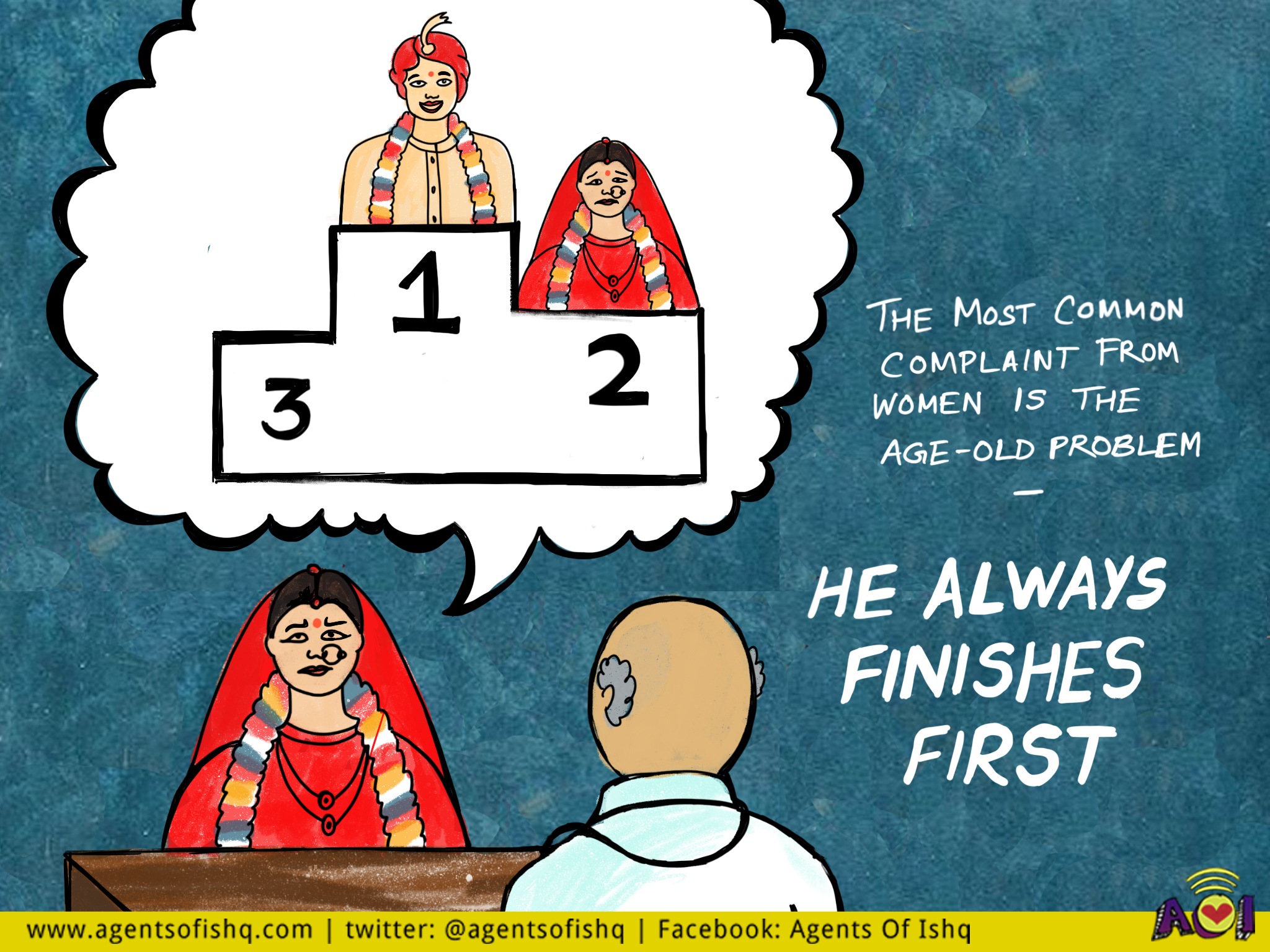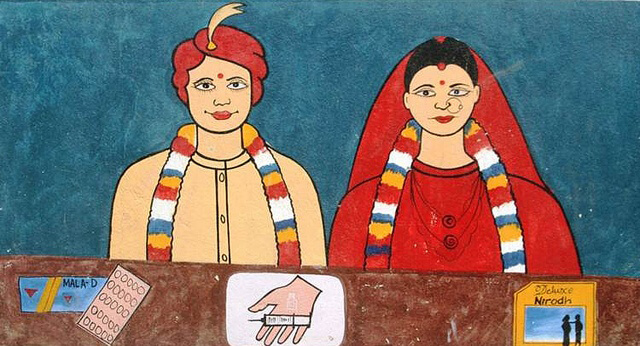Ramnath Bhuyan is a 33-year-old gynaecologist in a small town 50 kilometers away from Guwahati. He has been working at a maternity hospital there for three years now — he returned home after stints in cities like Delhi and Bombay (where people hardly visit male gynaecologists, he says), and a mostly rural set up in Sholapur. The difficulty in Sholapur had been that all his patients wanted to get their uterus removed for the smallest of problems. When he came back home to work in his small town, he faced a set of new challenges — he began to deal largely with infertility cases, which meant he needed to ask his patients about sex. He tells us about what he has learned about intimate life from his work.
A woman once came to me and said she liked being on top while having sex with her husband. But she was worried. Would being on top make it harder for her to get pregnant? She wasn’t sure if the semen was going inside her or not — you know, because it seemed like more was coming outside than going in. You’d be surprised at how common a question that is; this business of it all coming out. But actually everything that needs to go inside already has. Working as a gynaecologist in a town about 50 kilometers from Guwahati, is very different from working in the city. I’ve been here, working in my father’s hospital for three years now. I did my medicine in Manipal, then came home to Guwahati and was at the Guwahati Medical College for a year, before moving to Delhi and Mumbai. So I’ve worked in cities a lot, except for a stretch in the middle in Sholapur at a mostly rural set-up. In cities, women didn’t ask me about the technicalities of sex. A pregnant woman, or a young woman who has a problem with her period isn’t going to tell you about her sex life. Perhaps, they’ve done their homework on that front, because they have easy access to that kind of information. Instead, they asked about specific problems — like infections, STDs, or contraception, sometimes even about putting on weight because of contraceptives.In our Maternity Hospital, I treat a very broad category of people, mostly between the ages of 18 and 24. And after coming here, I have been dealing quite a bit with infertility cases. I find myself asking rather specific questions about my patients’ sex lives; personal questions that aren’t usually asked. The kind that never happened to me in the city? Nobody came to me worried they haven’t had children yet, only for us to find on repeated questioning that the couple had not had sex at all. In our town most of the time both husband and wife come to talk to me because they think they’re infertile. I say ‘think’ because once we do the examination and tests we need to, we often find that there’s actually nothing wrong. It’s at this point that we have to start asking again and again, politely of course, if they are having a problem with intercourse. Then there are some bad cases, when the wife is just 16 years old, and we have to say that she’s probably too young to have children.Once, a couple came to me because they hadn’t had children, but the examination showed that neither of them was infertile. So I kept asking about sex, until suddenly it became clear that they had been having only anal sex. Then there was also a time when a couple came to me saying the husband had a decreased libido. But actually, the husband wasn’t particularly interested in having sex with his wife because he preferred porn. What follows in each of these cases is a lot of counselling.One thing that’s often common in infertility cases in rural and urban India — men flat out refuse to undergo any tests to check if they’re infertile. They say it’s all the woman’s fault. I know a man who was worked up enough to divorce his wife because they hadn’t had kids, but was still refusing to get tested himself. And then in Nalbari, there are women who have infertility, related to poly cystic ovarian syndrome, but their husbands don’t want to spend on treatment, so they start having extra marital affairs instead.
The kind that never happened to me in the city? Nobody came to me worried they haven’t had children yet, only for us to find on repeated questioning that the couple had not had sex at all. In our town most of the time both husband and wife come to talk to me because they think they’re infertile. I say ‘think’ because once we do the examination and tests we need to, we often find that there’s actually nothing wrong. It’s at this point that we have to start asking again and again, politely of course, if they are having a problem with intercourse. Then there are some bad cases, when the wife is just 16 years old, and we have to say that she’s probably too young to have children.Once, a couple came to me because they hadn’t had children, but the examination showed that neither of them was infertile. So I kept asking about sex, until suddenly it became clear that they had been having only anal sex. Then there was also a time when a couple came to me saying the husband had a decreased libido. But actually, the husband wasn’t particularly interested in having sex with his wife because he preferred porn. What follows in each of these cases is a lot of counselling.One thing that’s often common in infertility cases in rural and urban India — men flat out refuse to undergo any tests to check if they’re infertile. They say it’s all the woman’s fault. I know a man who was worked up enough to divorce his wife because they hadn’t had kids, but was still refusing to get tested himself. And then in Nalbari, there are women who have infertility, related to poly cystic ovarian syndrome, but their husbands don’t want to spend on treatment, so they start having extra marital affairs instead. Information or the lack of it is not always the problem. In many cases, I’ve noticed that when couples think they are facing decreased libido or infertility, it’s something else altogether. It’s that they are having mechanical sex without feelings or intimacy. Sometimes, there’s no emotion involved because the couple hardly knows each other. The fact of the matter is that they’re unaware of each other and each other’s bodies. It’s the reason women come in with post-coital tears and bleeding — the women are not wet enough, aroused enough, but the husbands are trying to push their penis inside anyway, especially when they’re newly married. When we see cases like this we do a lot of counselling. We keep telling the couple that they need to talk to each other. As it is there’s very little conversation between them: the man goes off to work in the morning, and when they go to bed at night, the man complains the woman isn’t interested, when the case is probably that she’s exhausted after a day of cleaning, cooking, looking after the kids, and washing clothes. Sometimes, when the woman comes on her own, she says her husband isn’t interested when she is. But there is no room for her to tell her husband this.
Information or the lack of it is not always the problem. In many cases, I’ve noticed that when couples think they are facing decreased libido or infertility, it’s something else altogether. It’s that they are having mechanical sex without feelings or intimacy. Sometimes, there’s no emotion involved because the couple hardly knows each other. The fact of the matter is that they’re unaware of each other and each other’s bodies. It’s the reason women come in with post-coital tears and bleeding — the women are not wet enough, aroused enough, but the husbands are trying to push their penis inside anyway, especially when they’re newly married. When we see cases like this we do a lot of counselling. We keep telling the couple that they need to talk to each other. As it is there’s very little conversation between them: the man goes off to work in the morning, and when they go to bed at night, the man complains the woman isn’t interested, when the case is probably that she’s exhausted after a day of cleaning, cooking, looking after the kids, and washing clothes. Sometimes, when the woman comes on her own, she says her husband isn’t interested when she is. But there is no room for her to tell her husband this. Actually, when women come alone I hear a lot of other questions. (Sometimes, even if they do come with their husbands, they wait till they’re alone with me during examination to ask me what they really want to know). The most common complaint from women, something that she can’t say to her husband, is the age-old problem — that he always finishes first. She might phrase it like that, but what this really means is that she is not reaching orgasm and the husband is not at all interested in making sure she has an orgasm too. This problem as you can imagine, is common in cities too.And very occasionally, a woman will come alone to the doctor if she is having pre-marital sex. These women come because they need contraception, and they can’t go to a medical store and buy it, because everyone will look at them weirdly. I had one bad case, a woman who had had pre-marital sex came to me with an ectopic pregnancy [where a fertilised egg implants outside the uterus]. We had to tell her parents and get permission to do a surgery even though she was over 18, because that is the norm here. It hits me every now and then how different things are here. There are almost no conversations about sex — sometimes young women don’t know anything about it until they’re suddenly in bed naked with a man. It’s no wonder then that couples think the problem is a decreased libido or infertility when it isn’t. Everybody, whether they’re from a village or a city needs to be educated about sex. Once that happens, sex might even become more enjoyable — as it should be.
Actually, when women come alone I hear a lot of other questions. (Sometimes, even if they do come with their husbands, they wait till they’re alone with me during examination to ask me what they really want to know). The most common complaint from women, something that she can’t say to her husband, is the age-old problem — that he always finishes first. She might phrase it like that, but what this really means is that she is not reaching orgasm and the husband is not at all interested in making sure she has an orgasm too. This problem as you can imagine, is common in cities too.And very occasionally, a woman will come alone to the doctor if she is having pre-marital sex. These women come because they need contraception, and they can’t go to a medical store and buy it, because everyone will look at them weirdly. I had one bad case, a woman who had had pre-marital sex came to me with an ectopic pregnancy [where a fertilised egg implants outside the uterus]. We had to tell her parents and get permission to do a surgery even though she was over 18, because that is the norm here. It hits me every now and then how different things are here. There are almost no conversations about sex — sometimes young women don’t know anything about it until they’re suddenly in bed naked with a man. It’s no wonder then that couples think the problem is a decreased libido or infertility when it isn’t. Everybody, whether they’re from a village or a city needs to be educated about sex. Once that happens, sex might even become more enjoyable — as it should be.
 Family planning poster in Bodh Gaya captured by Jim Luce
Family planning poster in Bodh Gaya captured by Jim Luce
A woman once came to me and said she liked being on top while having sex with her husband. But she was worried. Would being on top make it harder for her to get pregnant? She wasn’t sure if the semen was going inside her or not — you know, because it seemed like more was coming outside than going in. You’d be surprised at how common a question that is; this business of it all coming out. But actually everything that needs to go inside already has. Working as a gynaecologist in a town about 50 kilometers from Guwahati, is very different from working in the city. I’ve been here, working in my father’s hospital for three years now. I did my medicine in Manipal, then came home to Guwahati and was at the Guwahati Medical College for a year, before moving to Delhi and Mumbai. So I’ve worked in cities a lot, except for a stretch in the middle in Sholapur at a mostly rural set-up. In cities, women didn’t ask me about the technicalities of sex. A pregnant woman, or a young woman who has a problem with her period isn’t going to tell you about her sex life. Perhaps, they’ve done their homework on that front, because they have easy access to that kind of information. Instead, they asked about specific problems — like infections, STDs, or contraception, sometimes even about putting on weight because of contraceptives.In our Maternity Hospital, I treat a very broad category of people, mostly between the ages of 18 and 24. And after coming here, I have been dealing quite a bit with infertility cases. I find myself asking rather specific questions about my patients’ sex lives; personal questions that aren’t usually asked. The kind that never happened to me in the city? Nobody came to me worried they haven’t had children yet, only for us to find on repeated questioning that the couple had not had sex at all. In our town most of the time both husband and wife come to talk to me because they think they’re infertile. I say ‘think’ because once we do the examination and tests we need to, we often find that there’s actually nothing wrong. It’s at this point that we have to start asking again and again, politely of course, if they are having a problem with intercourse. Then there are some bad cases, when the wife is just 16 years old, and we have to say that she’s probably too young to have children.Once, a couple came to me because they hadn’t had children, but the examination showed that neither of them was infertile. So I kept asking about sex, until suddenly it became clear that they had been having only anal sex. Then there was also a time when a couple came to me saying the husband had a decreased libido. But actually, the husband wasn’t particularly interested in having sex with his wife because he preferred porn. What follows in each of these cases is a lot of counselling.One thing that’s often common in infertility cases in rural and urban India — men flat out refuse to undergo any tests to check if they’re infertile. They say it’s all the woman’s fault. I know a man who was worked up enough to divorce his wife because they hadn’t had kids, but was still refusing to get tested himself. And then in Nalbari, there are women who have infertility, related to poly cystic ovarian syndrome, but their husbands don’t want to spend on treatment, so they start having extra marital affairs instead.
The kind that never happened to me in the city? Nobody came to me worried they haven’t had children yet, only for us to find on repeated questioning that the couple had not had sex at all. In our town most of the time both husband and wife come to talk to me because they think they’re infertile. I say ‘think’ because once we do the examination and tests we need to, we often find that there’s actually nothing wrong. It’s at this point that we have to start asking again and again, politely of course, if they are having a problem with intercourse. Then there are some bad cases, when the wife is just 16 years old, and we have to say that she’s probably too young to have children.Once, a couple came to me because they hadn’t had children, but the examination showed that neither of them was infertile. So I kept asking about sex, until suddenly it became clear that they had been having only anal sex. Then there was also a time when a couple came to me saying the husband had a decreased libido. But actually, the husband wasn’t particularly interested in having sex with his wife because he preferred porn. What follows in each of these cases is a lot of counselling.One thing that’s often common in infertility cases in rural and urban India — men flat out refuse to undergo any tests to check if they’re infertile. They say it’s all the woman’s fault. I know a man who was worked up enough to divorce his wife because they hadn’t had kids, but was still refusing to get tested himself. And then in Nalbari, there are women who have infertility, related to poly cystic ovarian syndrome, but their husbands don’t want to spend on treatment, so they start having extra marital affairs instead. Information or the lack of it is not always the problem. In many cases, I’ve noticed that when couples think they are facing decreased libido or infertility, it’s something else altogether. It’s that they are having mechanical sex without feelings or intimacy. Sometimes, there’s no emotion involved because the couple hardly knows each other. The fact of the matter is that they’re unaware of each other and each other’s bodies. It’s the reason women come in with post-coital tears and bleeding — the women are not wet enough, aroused enough, but the husbands are trying to push their penis inside anyway, especially when they’re newly married. When we see cases like this we do a lot of counselling. We keep telling the couple that they need to talk to each other. As it is there’s very little conversation between them: the man goes off to work in the morning, and when they go to bed at night, the man complains the woman isn’t interested, when the case is probably that she’s exhausted after a day of cleaning, cooking, looking after the kids, and washing clothes. Sometimes, when the woman comes on her own, she says her husband isn’t interested when she is. But there is no room for her to tell her husband this.
Information or the lack of it is not always the problem. In many cases, I’ve noticed that when couples think they are facing decreased libido or infertility, it’s something else altogether. It’s that they are having mechanical sex without feelings or intimacy. Sometimes, there’s no emotion involved because the couple hardly knows each other. The fact of the matter is that they’re unaware of each other and each other’s bodies. It’s the reason women come in with post-coital tears and bleeding — the women are not wet enough, aroused enough, but the husbands are trying to push their penis inside anyway, especially when they’re newly married. When we see cases like this we do a lot of counselling. We keep telling the couple that they need to talk to each other. As it is there’s very little conversation between them: the man goes off to work in the morning, and when they go to bed at night, the man complains the woman isn’t interested, when the case is probably that she’s exhausted after a day of cleaning, cooking, looking after the kids, and washing clothes. Sometimes, when the woman comes on her own, she says her husband isn’t interested when she is. But there is no room for her to tell her husband this. Actually, when women come alone I hear a lot of other questions. (Sometimes, even if they do come with their husbands, they wait till they’re alone with me during examination to ask me what they really want to know). The most common complaint from women, something that she can’t say to her husband, is the age-old problem — that he always finishes first. She might phrase it like that, but what this really means is that she is not reaching orgasm and the husband is not at all interested in making sure she has an orgasm too. This problem as you can imagine, is common in cities too.And very occasionally, a woman will come alone to the doctor if she is having pre-marital sex. These women come because they need contraception, and they can’t go to a medical store and buy it, because everyone will look at them weirdly. I had one bad case, a woman who had had pre-marital sex came to me with an ectopic pregnancy [where a fertilised egg implants outside the uterus]. We had to tell her parents and get permission to do a surgery even though she was over 18, because that is the norm here. It hits me every now and then how different things are here. There are almost no conversations about sex — sometimes young women don’t know anything about it until they’re suddenly in bed naked with a man. It’s no wonder then that couples think the problem is a decreased libido or infertility when it isn’t. Everybody, whether they’re from a village or a city needs to be educated about sex. Once that happens, sex might even become more enjoyable — as it should be.
Actually, when women come alone I hear a lot of other questions. (Sometimes, even if they do come with their husbands, they wait till they’re alone with me during examination to ask me what they really want to know). The most common complaint from women, something that she can’t say to her husband, is the age-old problem — that he always finishes first. She might phrase it like that, but what this really means is that she is not reaching orgasm and the husband is not at all interested in making sure she has an orgasm too. This problem as you can imagine, is common in cities too.And very occasionally, a woman will come alone to the doctor if she is having pre-marital sex. These women come because they need contraception, and they can’t go to a medical store and buy it, because everyone will look at them weirdly. I had one bad case, a woman who had had pre-marital sex came to me with an ectopic pregnancy [where a fertilised egg implants outside the uterus]. We had to tell her parents and get permission to do a surgery even though she was over 18, because that is the norm here. It hits me every now and then how different things are here. There are almost no conversations about sex — sometimes young women don’t know anything about it until they’re suddenly in bed naked with a man. It’s no wonder then that couples think the problem is a decreased libido or infertility when it isn’t. Everybody, whether they’re from a village or a city needs to be educated about sex. Once that happens, sex might even become more enjoyable — as it should be.

































































































































































































































































































































































































































































































































































































































































































































































































































































































































































































































































































































































































































